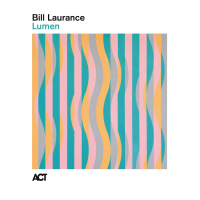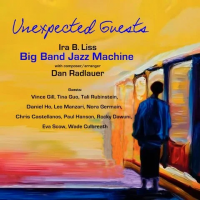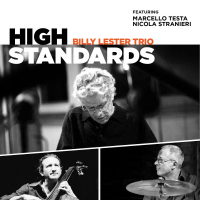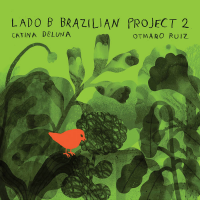Home » Jazz Articles » Album Review » Steve Khan: Patchwork
Steve Khan: Patchwork

Pat Metheny
guitarb.1954

Antonio Sanchez
drumsb.1971

Christian Scott aTunde Adjuah
trumpetb.1983
But for a real window into just how much consideration, time and sweat goes into conceiving a single tune (let alone an entire album), just take a look at the news section of Steve Khan's website where, in addition to other regular (and enlightening) bits and bobs, the guitarist regularly posts detailed notes about the conception and execution of his recordings.
Case in point: Khan's notes about Patchwork, the guitarist's fourth installment in a most decided and inimitable exploration of the nexus point where jazz guitar and Latin/Afro Cuban rhythms meet. His website notes reveal, with extraordinary honesty, everything from crises of confidence and moments of grand inspiration to the cornerstones of his ever-imaginative arrangements and much, much more.
Those who've followed Khan's career over the decades know that he's been moving towards this truly unique intersection point for a long time. The Latin influences are crystal clear on earlier Tone Center albums of the new millennium, like 2007's Borrowed Time and 2005's The Green Field.
Still, the guitarist's love affair with all things Latin actually dates further back still, to albums like Public Access (GRP, 1989) (recently collected, almost in its entirety, on BGO Records' 2018 double-disc set Public Access / Headline / Crossings). And while a little less overtly so, there are still plenty of hints of what's to come across Khan's three early '80s Eyewitness band albums, recently reissued, again by BGO, on its 2016 two- CD set, The Eyewitness Trilogy, which collects Eyewitness (Antilles, 1981), Modern Time's (Trio Records, 1982) and Casa Loco (Antilles, 1984).
But beyond Khan's gradual, relatively late in life emergence as the preeminent guitarist in Latin jazz, there's another thread that connects every entry in what has, with Patchwork, now expanded to a quadrilogy. Literally every album, from 2011's Parting Shot through 2014's Subtext to 2017's Backlog seemed, at the time, like it would be Khan's last.
And yet, from fearing loss of inspiration to physical issues that might have brought his days as a guitarist to an end (but, thankfully, have not), with each album since Parting Shot Khan has not only continued to hone his distinctive marriage of the many facets and touchstones of his musical career into a Latin-informed musical context; he's also managed to raise his game significantly with each successive release.
After a slight personnel detour with Backlog, where Khan's longtime first-call drummer

Dennis Chambers
drumsb.1959

Mark Walker
drumsb.1961

Oregon
band / ensemble / orchestra
Lyle Mays
keyboards1953 - 2020

Brecker Brothers
band / ensemble / orchestra
John Scofield
guitarb.1951

Steely Dan
band / ensemble / orchestrab.1972

John McLaughlin
guitarb.1942
Marc Quinones
percussionBobby Allende
congas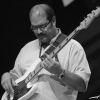
Ruben Rodriguez
bassAs irrefutably fine as the lineup on Backlog was, it's great to have Chambers back in the fold, giving Patchwork the same kind of effortless energy and percussion simpatico as Parting Shot and, in particular, Subtext, where longtime Khan contrabassist

Anthony Jackson
bass, electricPerhaps the biggest shift, personnel-wise, with Patchwork is the far greater participation of keyboardist, composer and arranger

Rob Mounsey
keyboards
James Taylor
guitar and vocalsb.1948

Paul Simon
composer / conductorb.1941
Since Parting Shot, Khan has gradually moved away from his own writing, with that album's seven original compositions/co- compositions reducing to Subtext's three and Backlog's none. Khan's focus may, indeed, have leaned further away from original composition, moving more decidedly towards imaginative and innovative Latin-inflected rearrangements (both harmonically and, perhaps most importantly, rhythmically) of music written by artists including, most prominently,

Thelonious Monk
piano1917 - 1982

Ornette Coleman
saxophone, alto1930 - 2015

Bobby Hutcherson
vibraphone1941 - 2016
Khan's connection to Monk dates back to his extraordinary Evidence (Arista Novus, 1980), a solo album that, with multiple layers of overdubbed guitar parts (and, on one track, percussion) and creative arrangements of music by artists including Shorter,

Lee Morgan
trumpet1938 - 1972

Horace Silver
piano1928 - 2014

Joe Zawinul
keyboards1932 - 2007

Randy Brecker
trumpetb.1945
In retrospect it's something of a surprise that Khan's Monk medley did not include "Epistrophy," the legendary pianist/composer's very first copyrighted composition from 1941, co- written with

Kenny Clarke
drums1914 - 1985
Joe Guy
b.1920"Epistrophy" was, in fact, the seed that eventually grew into Patchwork, its germination stemming from a conversation with Mark Walker in July, 2018 that not only led to Khan's arranging the tune with an Afro-Cuban 6/8 pulse (actually, a blend of 6/8 and a swinging six-over-four rhythm) but, with no firm idea for a new album in mind, quickly led to six more arrangements in a period of just six weeks. As Khan enthuses on his website, "To have relocated my creative center felt like a miracle— because I was certain that it was never going to visit me again."
Listening to the finished result, it seems incredulous that Khan had any doubts about his ability to find inspiration for his fourth "final" recording. Once again revisiting regular inspirations Monk (with "Epistrophy") and Coleman ("C. & D." and ""T. & T.," both from the saxophonist's 1962 Atlantic classic, Ornette!, from which Khan had already reworked "R.P.D.D." for his 1996 Evidence date, Got My Mental), Khan continues to mine Bobby Hutcherson's Happenings (Blue Note, 1967), this time adding his gorgeous look at the balladic "Bouquet" to the fiercer "Head Start" and more ambling "Rojo" that both appeared on Backlog.
"Epistrophy" opens Patchwork with the kind of patience that has defined Khan since he deserted fusion forty years ago, with a two-chord vamp driven by the percussion section lasting for a full half minute before Khan moves to Monk's familiar theme, albeit supported by Mounsey in a fashion that may appear to have little to do with Monk directly, but is, in fact, more clearly connected than it might seem with its its skewed harmonic angularity. Add Khan's solo, which blends jagged but still soft-toned phrases with the occasional seamless injection of a harmonizer to broaden Khan's scope, and Chambers' exhilarating extemporizing as the song fades on the same two changes as the intro, and "Epistrophy" sets a high bar for the rest of Patchwork.
A high bar that's not only met but, in a variety of ways, exceeded throughout the rest of the album. Both of Khan's Coleman arrangements continue to assert the guitarist's remarkable ability to evoke surprising harmonies from music that, at best, only intimated them as a result of Coleman's regular use of chord-less groups on Ornette! and many other recordings from the time. Veteran

Yellowjackets
band / ensemble / orchestrab.1977

Bob Mintzer
saxophoneb.1953
"T. & T.," another upbeat arrangement of a Coleman tune from Ornette!, is based on the Mozambique rhythm that

Ed Blackwell
drums1929 - 1992

Joe Henderson
saxophone1937 - 2001
Here, "A Shade of Jade" is most notable for Randy Brecker's virtuosic flЁ№gelhorn solo, which combines light-speed lines with equally effortless reaches up into the stratosphere, along with some three- part horn overdubs that Khan had written for the trumpeter but, as Khan relates, "other than a few horn stabs, I never expected that Randy would actually perform them all." The result, beyond Brecker's exceptional solo, which also injects singable melodies into his more visceral instrumental acumen, is the first time that Khan has employed any kind of horn section since his early fusion albums for Columbia (1977's Tightrope, 1978's The Blue Man and 1979's Arrows), all collected into a two-CD set by BGO in 2015.
In yet another collection that finds Khan raising his game on all fronts, Patchwork's arrangement of Bobby Hutcherson's "Bouquet" is a particular high point. Khan first performed the song during occasional all-acoustic duo gigs with fellow six- stringer,

Larry Coryell
guitar1943 - 2017
Performed as a bolero, with its harmonic underpinning reflecting an unmistakable voice that dates back to Khan's earliest recordings, Mounsey's orchestrations for "Bouquet" entice some of Khan's finest steel-string acoustic guitar playing to date, driven gently by Chambers' subtle brush work and similarly tasty percussion from Qui?ones and Allende. It's difficult to overstate just how successful Khan's reading is, here, of one of Hutcherson's best compositions from one of his most memorable Blue Note recordings from the '60s.
Khan has only visited the music of

Keith Jarrett
pianob.1945
A stunningly beautiful rubato duet intro, featuring Khan's gorgeous nylon-string guitar work and Mounsey's dark-hued Fender Rhodes and subsequent orchestrations, leads into the cha-cha-cha-driven second section, where Khan's warm- toned electric guitar evokes all of Jarrett's melodic and harmonic ideations and more. His lengthy solo unfolds slowly, the absolute epitome of taste and restraint, with overdubbed, whammy bar-driven Stratocaster chords adding further tension and release.
As the piece moves into its third section (really two parts in 3/4 and 9/8 respectively), through-composition re-emerges as Khan moves, first, from a melody that gradually evolves with the addition of wordless vocals from Khan and singer Tatiana Parra (back from Parting Shot and Backlog), leading to an elegant synth solo from Mounsey that gradually builds towards the song's ultimate fade-out, with Chambers not exactly featured but nevertheless driving the song to its inevitable conclusion through a remarkable stylistic cross- pollination of, as Khan describes it, "gospel music, R&B, and jazz and jazz fusion."
Potent stuff, all making "The Journey Home," despite being Patchwork's penultimate track, somehow feel like its centerpiece.
While largely sourcing his music from jazz composers, it's a rare Steve Khan album that doesn't include at least one song from the Great American Songbook, and Patchwork is no exception. A beautiful, string-augmented arrangement of the Alan Jay Lerner and Burton Lane classic "Too Late Now" graces Patchwork. A song originally written for Stanley Donan's 1951 film Royal Wedding but recorded many times since, it's singer

Nancy Wilson
vocals1937 - 2018
If Khan's love and respect for Mays' orchestral work on the Nancy Wilson version is clear, so, too, are his similar feelings for Mounsey, whose own orchestral contributions to Khan's arrangement of the song for Patchwork are just as impressive, with the song also reflecting the two musicians' clear love for keyboardist/composer/arranger

Clare Fischer
piano1928 - 2012
Khan also delivers some surprisingly virtuosic work, this time on nylon-string guitar, for "HuracЁўn Clar," an album-closer with an unusual backstory. Jorge Estrada's composition is, indeed, a curious inclusion in that its instrumental core came from a session that Khan did for bassist/producer

Jimmy Haslip
bassb.1951
With the advent of DIY studios, the idea of musicians recording their parts separately but bringing them together through file sharing is far from novel; still, the idea of having a group record a version of a song but also including original parts from a completely different session is. And between the rubato melody that appears at various points throughout the song (again bolstered by the guitarist's wordless vocals), a bright-tempo'd main section that leads to Khan's fiery guitar solo, Allende's fiery conga feature and an equally impressive electric piano solo from Estrada, it brings Patchwork to a fitting close.
Or does it?
The CD clearly features only nine tunes, closing with "HuracЁўn Clare," but there was, in fact, a tenth piece arranged and recorded for Patchwork. With insufficient space to include it on a CD that already clocks in at nearly 78 minutes, Khan's relatively short, largely through- composed arrangement of eden ahbez's 1947 classic, "Nature Boy," is, nevertheless, a compelling look at another evergreen tune that has something of is own unusual backstory.
First recorded by

Nat King Cole
piano and vocals1919 - 1965
Finally, if Backlog was a rare Khan recording not to feature at least one original composition, the guitarist returns to writing with "Naan Issue," inspired, harmonically, by the title track to guitar legend

Wes Montgomery
guitar1923 - 1968
The chemistry of Khan's core group has never sounded this good, nor has the diversity of the material and its reinterpretations been so profoundly broad. Khan's reputation as a guitarist has never achieved the kind of acclaim and attention that his still-living, late sixties/early seventies guitar colleagues including Pat Metheny,

John Scofield
guitarb.1951

Bill Frisell
guitar, electricb.1951
It also bears noting that as impeccable and detailed as Khan is in approaching everything he does musically, it's his collaborations with other musicians, arrangers/orchestrators, and with both engineers and pre-/post-production assistance that continue to contribute to the pristine and crystalline yet lush and warm nature of his recordings, especially those in his Latin jazz quadrilogy.
When it comes to Patchwork, Khan's musicians have consistently contributed truly ideal interpretations of the guitarist's original music and his distinctive arrangements of others' writing for a Latin context; renowned engineer/mixer James Farber once again manages to not only capture what Khan and his musicians were laying down in the studio, but successfully carry it all forward into a finished album that truly leaps from the speakers with vivid life and evocative beauty; and Khan's astute sequencing creates an experience far better appreciated as a whole rather than as a collection of individual (and, indeed, individually impressive) tracks.
Khan's career may have had its ups and downs when it comes to popular acclaim, but he remains the critically acclaimed underdog, as he has been for almost his entire career. Still, since returning to regular recording as a leader after a decade-long absence with The Green Field—and, in particular, with his emergence as the preeminent guitarist and arranger in Latin jazz beginning with Borrowed Time but more significantly with the quadrilogy that began with Parting Shot— Khan is irrefutable evidence that artists looking to evolve across the breadth of their careers often create their best work in their latter years.
At 72, Khan clearly has the potential of many more years and, hopefully, recordings to come. But (and this is beginning to sound like a broken record, but meant with the most love and respect possible) if Patchwork were to be the guitarist's final recording as a leader, it would ultimately be viewed as going out on an exceptionally high a note. ..."though I've had countless disappointments, and many regrets," Khan writes, "I can tell you that, when everything is tabulated, I feel like a most fortunate man. And, I am eternally grateful for what I've experienced."
Even if it were based solely on the many creative successes of Patchwork, the only appropriate response would have to be: right back at ya. If Khan is eternally grateful, then those with whom the guitarist has shared his experiences through his music can be nothing less than equally appreciative. ">
Track Listing
Epistrophy; C. & D. (CivilizaciЁ®n y sus Descontentos); Bouquet (Un Ramo De Flores); Naan Issue; Shade of Jade (Un Tono de Jade); Too Late Now (Demasiado Tarde); T. & T. (T?tem y TabЁІ); The Journey Home (El Camino a Casa); HuracЁўn Clare; Nature Boy (digital-only bonus track).
Personnel
Steve Khan
guitarDennis Chambers
drumsRuben Rodriguez
bassRob Mounsey
keyboardsBobby Allende
congasMarc Quinones
percussionRandy Brecker
trumpetBob Mintzer
saxophoneTatiana Parra
vocalsJorge Estrada
keyboardsAlbum information
Title: Patchwork | Year Released: 2019 | Record Label: Tone Center
Tags
Comments
PREVIOUS / NEXT
Support All About Jazz
 All About Jazz has been a pillar of jazz since 1995, championing it as an art form and, more importantly, supporting the musicians who make it. Our enduring commitment has made "AAJ" one of the most culturally important websites of its kind, read by hundreds of thousands of fans, musicians and industry figures every month.
All About Jazz has been a pillar of jazz since 1995, championing it as an art form and, more importantly, supporting the musicians who make it. Our enduring commitment has made "AAJ" one of the most culturally important websites of its kind, read by hundreds of thousands of fans, musicians and industry figures every month.








 Buy Now
Buy Now






